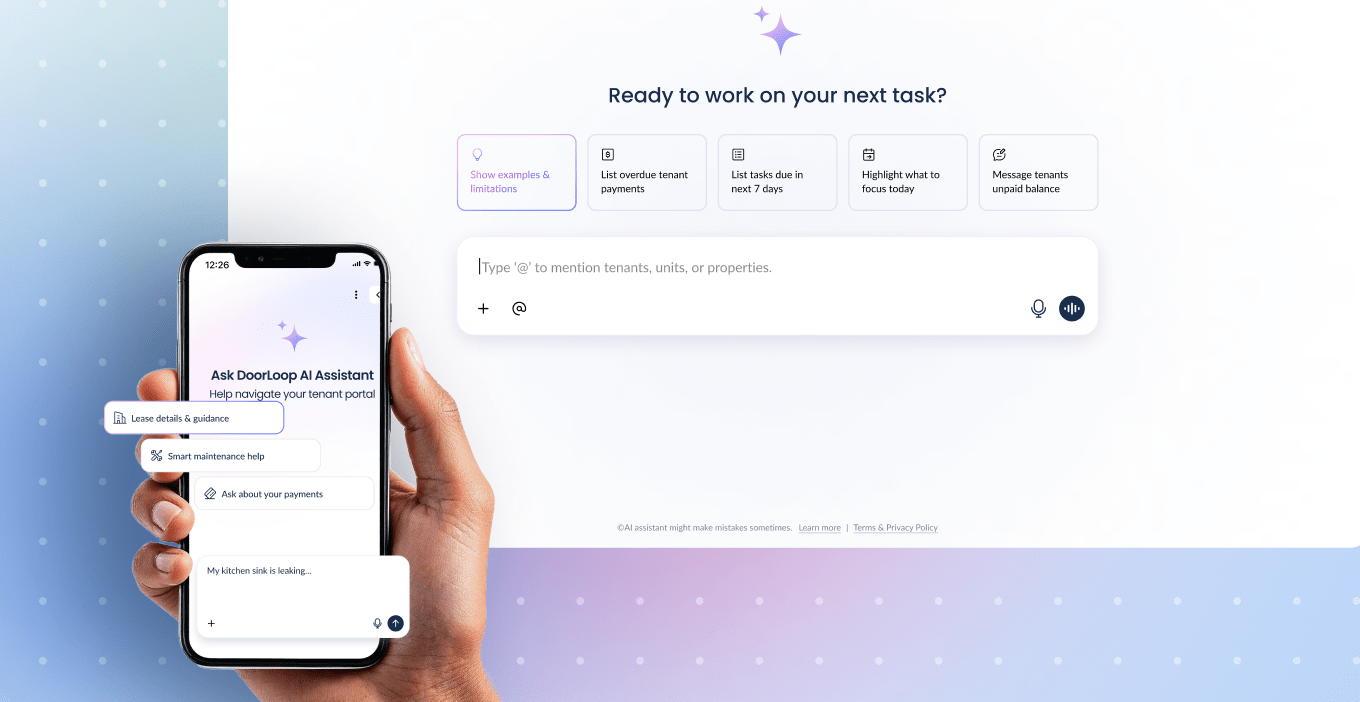In recent years, the real estate industry, especially property management, has witnessed a remarkable transformation due to advances in technology. One such advancement making waves is generative artificial intelligence (AI).
Powered by machine learning algorithms, generative AI is revolutionizing property management and enabling property managers to run their businesses smarter and more easily than ever.
In this blog post, we will explore the applications and benefits of generative AI in property management, highlighting how it can streamline processes, improve efficiency, and enhance decision-making.
Learn the ins and outs of this cutting-technology so you, too, can adopt an AI property management strategy, automate time-consuming tasks, make informed decisions, improve your resident experience, and watch your business thrive.
What Is Generative AI?
Generative AI focuses on training algorithms to generate new content that resembles human creations.
It utilizes machine learning techniques to analyze patterns and examples from existing data and produces original outputs based on that analysis.
Generative AI has gained significant attention due to its ability to create realistic and innovative content in various domains, including images, texts, music, and even videos.
Examples of Generative AI
Here are some examples of generative AI, which has given companies across many industries a competitive edge:
- Image Generation: Generative adversarial networks (GANs) have made remarkable strides in generating highly realistic images. These algorithms can create lifelike portraits, landscapes, and even animals, showcasing the potential for creative applications in art, advertising, and design.
- Text Generation: Language models powered by generative AI can generate coherent and contextually relevant text. This technology enables the creation of human-like stories, articles, and even conversational chatbots that engage users in natural language interactions.
- Music Composition: Generative AI algorithms are being employed to compose original music by learning patterns from existing compositions. These algorithms can generate melodies, harmonies, and rhythms, opening up possibilities for new compositions and creative collaborations.
- Video Synthesis: Through generative AI, video synthesis algorithms can generate realistic and coherent videos.
In general, generative AI has incredibly diverse capabilities and is an excellent tool for creating realistic and original content.
Applications of Generative AI
Beyond the aforementioned examples of how generative AI may be used, here are broader applications for these powerful tools:
- Content Creation and Design: Generative AI can automate content creation by generating blog posts, social media captions, and marketing materials. Additionally, it can aid in graphic design by making visuals, logos, and layouts.
- Personalized Recommendations: By analyzing user preferences and historical data, generative AI can provide personalized recommendations for products, services, or content. This enhances the user experience by tailoring suggestions to individual tastes and needs.
- Virtual Reality and Simulation: Generative AI is utilized in virtual reality (VR) and simulation environments to create realistic and immersive experiences. This includes virtual training programs, gaming scenarios, and architectural visualizations.
- Medical Research and Drug Discovery: Generative AI assists in medical research by analyzing vast amounts of data to identify patterns and make predictions. It aids in drug discovery by suggesting potential compounds and optimizing molecular structures.
- Natural Language Processing: Generative AI models excel in natural language processing tasks, such as machine translation, chatbots, and sentiment analysis. They can understand and generate text, facilitating communication and information retrieval.
Considering the omnipresence of generative AI in today's society, some of these examples and applications might already be familiar to you! But how do these powerful tools help in property management specifically?
AI for Property Management
Generative AI for Property Management
Are you a property owner or property manager looking to automate your workflow and save over 23 hours a month using AI to help manage your properties? DoorLoop's property management software has launched their AI Assistant to help you work smarter, get more done in less time, and resolve over 80% of tenants questions.

The Role of Generative AI in Property Management
As a property manager, integrating generative AI into your operations can have a transformative impact on various aspects of property management.
From optimizing property listings to automating maintenance and enhancing customer experiences, generative AI offers numerous benefits that can streamline processes, improve efficiency, and drive success for any property management company.

Property Listing Optimization
When it comes to attracting potential buyers or tenants, compelling property listings play a crucial role.
Generative AI can assist you in creating captivating rental ads that stand out from the competition. By leveraging machine learning algorithms, you can generate engaging and persuasive content that highlights the unique selling points of your properties.
Furthermore, generative AI allows property managers to tailor their listing details based on the preferences of your target audience. Algorithms can analyze data and user behavior to identify patterns and generate content that resonates with specific buyer or tenant segments.
This level of personalization can significantly enhance the effectiveness of your property listings.
To optimize your property listings for search engines, it's important to incorporate relevant keywords. Generative AI can help you with this and do the following for you:
- Increase the visibility of your rental listings in search engine results
- Attract more organic traffic
- Increase the number of potential tenants applying for your rental listings
Virtual Staging and Interior Design
Staging is critical to filling vacancies, but physical staging is time-consuming and costly.
With generative AI, you can digitally stage and decorate properties, providing prospective tenants with a realistic visualization of the space before they visit or apply for your property.
Using generative AI algorithms, you can virtually furnish properties with various design options, allowing potential clients to envision themselves in the space. This not only saves you time and money but also provides flexibility in showcasing different interior styles to cater to diverse preferences.
Predictive Analytics for Rental Prices
Accurately determining rental prices is crucial for maximizing returns on your properties. Generative AI can play a vital role in this aspect with predictive analytics.
By analyzing historical data, market trends, and location factors, generative AI algorithms can predict rental prices with a high degree of accuracy.
These predictive insights enable you to make data-driven pricing decisions, ensuring that your properties remain competitive in the market. By aligning your rental prices with market demand, you can optimize occupancy rates and maximize rental income.
Maintenance and Repairs Automation
Maintenance and repairs are an integral part of property management, and generative AI can streamline these processes.
By applying generative AI algorithms, you can automate maintenance tasks and detect potential issues before they escalate into costly repairs.
Generative AI can analyze sensor data, historical maintenance records, and property characteristics to identify patterns and predict maintenance requirements. This proactive approach helps you prioritize maintenance tasks, optimize resource allocation, and reduce operational costs.
AI Chatbots and Virtual Assistants
Customer service and good responsiveness is a boon in any industry. Property management is no exception. In fact, it's arguably one of the most important industries for this.
Generative AI-powered chatbots and virtual assistants can provide prompt and accurate assistance to potential buyers or tenants, ensuring their queries are addressed efficiently and taking a lot of stress and phone calls off the shoulders of landlords and property managers.
Implementing chatbots allows you to automate customer inquiries and provide instant responses to common questions. These AI-powered assistants can offer property information, schedule viewings, and provide personalized recommendations based on user preferences, thereby enhancing the overall customer experience.
By leveraging generative AI, you can optimize property management processes, improve customer engagement, and drive operational efficiency.
From creating compelling property listings to automating maintenance and enhancing customer interactions, generative AI opens up new possibilities for success property management.
Benefits of Generative AI in Property Management
Incorporating generative artificial intelligence into your property management practices can yield a wide range of benefits, empowering you to streamline operations, enhance customer experiences, and make data-driven decisions. Let's explore the key advantages that generative AI brings to the table.

Increased Efficiency and Productivity
By harnessing the power of generative AI, you can automate repetitive tasks and free up valuable time for strategic decision-making.
Generating property descriptions, staging virtual interiors, and predicting maintenance requirements are just a few examples of how artificial intelligence can help you automate workflows.
This automation not only saves you time but also improves operational efficiency, allowing you to focus on critical aspects of property management and turn your attention to growing your business.
Enhanced Tenant Experience
Generative AI enables you to deliver personalized experiences to prospective tenants.
By analyzing user preferences and historical data, you can provide tailored property recommendations that align with their specific needs and preferences.
Moreover, artificial intelligence facilitates virtual tours and interactive experiences, allowing clients to explore properties from the comfort of their own homes. These personalized and immersive experiences contribute to improved customer satisfaction and engagement.
Improved Decision-Making
Data-driven decision-making is a cornerstone of successful property management. Generative AI equips you with real-time data and predictive analytics to make informed choices.
By leveraging historical data, market trends, and predictive algorithms, you can gain insights into rental prices, occupancy rates, and property trends. These insights help you optimize pricing strategies, minimize risks, and maximize returns on your property investments.
Reduced Costs and Business Expenses
Artificial intelligence can significantly impact your bottom line by optimizing resources and reducing costs. By automating maintenance requests and repairs, you can detect potential issues early on, minimize downtime, and avoid costly repairs.
Additionally, virtual staging eliminates the need for physical staging, reducing expenses associated with furniture rental and transportation.
Overall, through cost optimization and increased operational efficiency, generative AI contributes to higher profitability in your property management endeavors.
Conclusion
As artificial intelligence continues to evolve, its impact on the property management industry becomes increasingly apparent. From optimizing property listings to automating maintenance and enhancing decision-making processes, generative AI is revolutionizing the way real estate professionals operate.
By harnessing the power of this technology and other smart solutions like property management software, property managers can improve efficiency, provide exceptional customer experiences, and achieve significant cost savings.
Embracing generative AI and proptech solutions in property management is not just a trend; it's a game-changer that will shape the future of the real estate industry.
Stay on top of the latest trends and adopt an AI property management strategy to take your business to the next level.
































.svg)
.svg)

